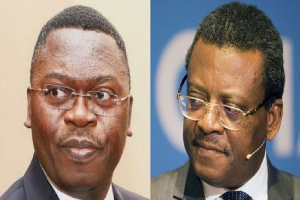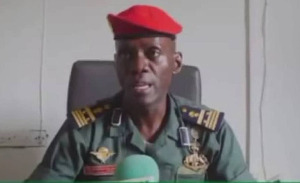The 2015 Africa Cup of Nations (CAN) in Equatorial Guinea was hyped as wide open and unpredictable. And with holders Nigeria failing to qualify and “bigger” teams such as Cameroon and Cote D’Ivoire in “transition” this was hype you could believe.
But talk of “no outstanding teams” was right on two levels. The drama of the final group games was down to mathematics not football. And although no-one was knocked out after two games, that didn’t mean they were any good. And while the quarter-finals produced goals and incident, that didn’t mean they were any good either.
There have been mitigating circumstances. Some of the weather has not been conducive to good football. And the pitches have been poor, although nothing matching sandcastle-friendly Nelspruit in South Africa in 2013. Neither has been within Equatorial Guinea’s control. They co-hosted the 2012 CAN. But whatever expertise they gained then was offset by the short preparation time afforded them now.
Well into the proverbial last minute, selected hosts Morocco refused to confirm their willingness to be hosts on the long-agreed dates, citing the Ebola epidemic in West Africa.
They – and their team, who qualified as hosts – were flung out. The Equato-Guineans were selected as on-and-off-field replacements on November 14th, leaving 64 days to prepare…EVERYthing.
Predictably, newly-laid pitches started unravelling under the first CAN-trademark sliding tackle. So the games have not been, to use modern commentary parlance, an “easy watch.” “A lack of quality in the final third” has been the buzz phrase. And more work appears to have gone into goal celebrations than setpieces.
Group A
Equatorial Guinea somehow made the 2012 quarter-finals, with a hastily-cobbled together team of, ahem, “qualified” Equato-Guineans lacking stand-out talent and experience. And now they’ve done even better. They are only at the finals as hosts, having exited the qualifiers after fielding an ineligible player against Mauritania. Reprieved by Morocco’s late collywobbles, they deserved their place in the last eight, albeit from demonstrably the weakest qualifying group.
Group winners Congo also exited the qualifiers, losing to Rwanda on penalties. But Rwanda also fielded an ineligible player and the reprieved Congolese won in, then knocked out, Nigeria. Such success is largely thanks to adhering to rule one of the CAN guide to tournament progress – make Claude Le Roy manager.
The bespectacled Frenchman is almost as much a CAN fixture as the trophy and has now overseen more quarter-final qualifications than, to use the technical term, “you could shake a stick at” (seven). However limited your team – and Congo are limited – Le Roy has what I’d like to think they call in France, a certain “I don’t know what.” The England job surely awaits.
Finalists last time, Burkina Faso probably created more chances this time but found multitudinous ways to not score. Jonathan Pitroipa and the large Traore contingent (even for a West African side) turned to jelly within sight of goal.
And even striker and part-time cheese spaghetti snack Aristide Bance couldn’t redeem them. Gabon were almost as jittery in front of goal and were over-reliant on Neymar-stunt-double Pierre-Emerick Aubameyang. He didn’t have a bad tournament but finished in a familiar place for a Borussia Dortmund player, second from bottom.
Equatorial Guinea’s vital victory over 2012 co-host Gabon was underpinned by an outrageous dive from Javier Balboa (I’ll resist the Rocky Balboa Jokes). He scuffed every available setpiece until converting his penalty and then skilfully set up perma-diving Iban Edu for the second goal. Their story, and penalty box fortune, continues.
Group B
Cape Verde’s diaspora-heavy team were a pleasant surprise in 2013. But if you replace “Platini” with “Stopyra” you will lose quality (one for fans of France’s 1980s team there). Also gone are 2012 champions Zambia, the “Copper Bullets” firing blanks (sorry). Enough rain to keep Noah at home largely reduced their match with Cape Verde to photo-opportunity-style aquaplaning. Goals were all-but-impossible and it would surely have been abandoned had there been time for a replay.
Zambia’s tournament turned on the injury to Southampton misfit Emanuel Mayuka. He crumpled in a heap after attempting to tap-in Zambia’s second goal against Tunisia, who equalised before he could be replaced. Tunisia’s tournament turned too. There haven’t been enough goals about to retrieve two-nil deficits. And Tunisia effectively won both match and group with Yasine Chikhaoui’s late header.
Half-paced and half-arsed though they’ve been, Tunisia should have been too good for the hosts in the quarter-finals. But…well…see below.
Yannick Bolasie’s of Crystal Palace magic helped the Democratic Republic of Congo (DRC) progress with three draws – after only being the best third-placed team in the qualifiers. That they are now semi-finalists says more about the quality of this tournament than any in-depth tactical analysis.
Group C
South Africa’s positive attitude and Algeria’s flashes of their 2014 World Cup form made this the least frustrating group. Over-physical Ghana were out-muscled by man-mountainous Senegal. But Senegal had size and creativity in inverse proportion.
The Black Stars’ Asamoah Gyan beat a defensive Algeria with a last-minute trademark goal, chasing down the violent Mubarak Wakaso’s long ball and sweeping it home on the run, completing a remarkable recovery from pre-tournament malaria. Algeria went into their third game topping the group, after their three-goal haul against South Africa (one own goal, one straight through the keeper). And they beat hapless Senegal two-nil, leaving Senegal supremo Alain Giresse “under duress.” Ho-ho.
Meanwhile Ghana were homeward-bound until two late goals crushed South Africa’s own qualification hopes. Andre Ayew flying through the air to head the winner will be a lasting tournament image. Yet despite table-topping Algeria bettering their final result, Ghana were group winners, as head-to-head results separate teams level on points. Which was to prove important.
Group D
Comparing disciplinary records was the final method of separating sides level on points in 2013. And however unsatisfactory that was, drawing lots was surely worse. And Guinea and Mali could have decided who made the last eight on penalties as they played each other in the final round. Indeed, the Group was one horrible header by Cameroon’s Stephane M’Bia from consisting entirely of one-one draws, which would have meant “a group with lots of draws” decided entirely “by the drawing of lots” (ITV4’s Matt Smith).
Cote D’Ivoire won the group with a Max Graedel wonder-strike which didn’t belong in this tournament, let alone their foul-ridden encounter with toothless Cameroon. The Ivorians have been typically unworthy of any favourites tag, led by a member of the public in a Yaya Toure fright-mask.
Even Kolo Toure showed more composure on the ball. Gervinho decisively returned for their quarter-finals, after a two-match ban for his prima-donna reaction to his opening-game dismissal. But mad though his Oscar-contender hissy-fit was – Ivorian boss Herve Renard has been the tournament’s lunatic fringe, constantly bawling out his players while taking physical retribution on defenceless water bottles, which at least padded-out ITV4’s “highlights” of the Ivorians’ group games.
Guinea joined Congo as “what passes for a surprise package.” Their draw against Cameroon was one of the better group games, which they might have won if they’d got the last-minute penalty the push on Ibrahima Conte merited. Kevin Constant netted a “Panninka” penalty against Mali. And that would have been some last kick of a game.
Mali’s Seydou Keita is almost as much a CAN ever-present as Claude Le Roy. At 35, though, you suspect this may be Keita’s last appearance. And for it to end with a penalty miss against Guinea and exit by drawing of lots was just wrong. Matt Smith, meanwhile, suggested that Cameroon were “arguably the better” for the absence of Samuel Eto’o and Alex Song. Wrong again.
Quarter-Finals
For all their fun and goals, the quarter-finals were largely ghastly. The first hour of the hosts’ win over Tunisia was a non-event – British Eurosport correctly, for once, crudely excised the lot from their highlights. Likewise the Congolese “derby” first-half, most of Ghana’s stroll against Guinea and Cote D’Ivoire’s win over Algeria until Algeria’s 51st-minute goal.
Still, what larks? Maybe it IS “good for the tournament that the hosts are still in it.” But that doesn’t excuse Equatorial Guinea’s 90th-minute penalty against Tunisia. To adapt a commentary cliché, “anywhere else on the pitch and that…wouldn’t have been given either.” Tunisia, already toasting nicely, went bats**t crazy, forgot to play football in extra-time and went bats**t crazier at the end, having lost to a truly wonderful Balboa free-kick.
But batshit crazier still was Eurosport’s Wayne Boyce, whose considered take – “dreadful decision but I’m sure an honest one” was way too late. “Let it go,” co-commentator Russell Osman advised a still-seething Boyce…24 hours later. Against Guinea, Ghana gained 90 minutes’ useful experience in despatching out-of-depth makeweights – which should prove handy against the hosts in the semis.
Guinea looked like they’d qualified after extra-time and penalties rather than drawing lots. They were beaten once Everton square-peg Christian Atsu scored after four minutes. And Baissama Sankoh’s Sunday League-style clearance to set up Ghana’s second goal finished them off…and possibly half the TV audience too. Atsu’s wondrous third goal belonged elsewhere.
Shorn of big names such as Didier Drogba et al, Cote D’Ivoire are apparently now worthy-ish favourites. And apparently “it was a shame the way the draw has gone that the two favourites meet here,” although that was entirely down to Algeria losing to Ghana (above).
Cote D’Ivoire were shorn of, ahem, combative midfielder Chiek Tiote (unsurprisingly suspended for the last group game but surprisingly not re-instated), while defender Eric Bailly defended like the “Weston-Super-Mare greengrocer” he apparently sounded like and Yaya Toure was “a passenger” who had “zero influence” on the game. This was all true. But Cote D’Ivoire were not shorn of their near-addiction to fouling (nine fouls to one after nineteen minutes). And, having wondered how Edin Dzeko might react to losing his Manchester City place to Wilfried Bony, suddenly I was watching a footballing superman, after Bony’s two goals all-but-destroyed Algeria’s challenge. Cote D’Ivoire’s year at last?
Possibly not, unless their shopkeeper-heavy defence deals with DR Congo’s Dieumerci Mbokani and Bolasie better than Congo (i.e. at all). Mbokani won every aerial challenge after Congo went two-up, 62 minutes into a game previously “pock-marked with niggles.” Bolasie simultaneously became near-unplayable. And DRC would have won by more had Jeremy Bokila not blasted most of their chances halfway to Kinshasa.
Other Stuff
Graedel’s thunderbolt against Cameroon at least facilitated a “goal of the tournament” competition – until the quarter-finals it looked like the official stats would have to include penalty shoot-outs to get the goals-per-game average above two.
Mandia Masanga’s dipping volley for South Africa against Ghana leads the way, especially as he picked himself off the floor to hit it. Bakary Sako’s blistering half-volley for Mali against Cameroon flew into the net like a tracer bullet even in the slow-motion replays. But at this rate, ITV4 and British Eurosport will have to rely on miscellaneous backflicks and idiosyncratic goalkeepers for their opening credits and tournament ads in 2017.
The officiating has been mixed. Bookings have been far harder earned than in the EPL, which has been (wrongly) presented as a bad thing. Offsides have been far easier earned, which has often been a very bad thing. One player was even flagged offside inside his own half…which you’d never see in the EPL…erm…
There isn’t much new to say about British Eurosport’s presentation. ITV4’s Efan Ekoku and, to a lesser extent, Quintin Fortune have been worth a listen, both improving with broadcasting experience. Peter Odemwingie might do likewise. Fabrice Muamba and Sebastien Bassong might not, although Fortune and Muamba’s regularly-diverging opinions have been fun. What Next?
Not a question I can confidently answer given that I predicted the demise of Cote D’Ivoire and the hosts in the quarters – and a Ghana/Algeria final. But… well, let’s put it this way. “Dear oh dear for the DRC,” noted Eurosport’s Matt Jackson, correctly, when Congo went two-up against them.
Yet a DRC/Equatorial Guinea final remains a prospect. Dear oh dear, indeed.
Sports Features of Wednesday, 4 February 2015
Source: twohundredpercent.net
Africa Cup Of Nations 2015: A lack of quality in every third













